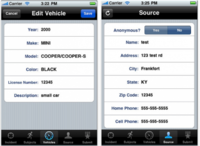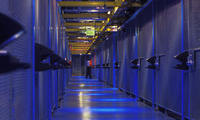-
Safeguarding the private and public sector from insider threats
While most discussion of insider threats have focused on cyber security concerns, a recent panel at the Government Security Convention and Expo in Washington, D.C. discussed the potential physical threats posed by insiders;businesses, government agencies, and other organizations are vulnerable to a host of threats from insiders including corporate espionage, workplace violence, and the loss of sensitive materials or data; panelists discussed efforts to reform the Federal Protection Services, which is charged with securing roughly 9,000 federal facilities, the latest technologies in detecting cell phones in secure areas, new body scanners, as well as the legality of stepped up security measures
-
-
Kentucky releases homeland security terrorist reporting app

Kentucky’s Office of Homeland Security (KOHS) recently released an iPhone app designed to allow people to anonymously report any suspicious activity they see; the app, called, Eyes and Ears on Kentucky, captures tips in real-time and is capable of providing additional information using the iPhone’s camera and GPS features; the app comes as part of the broader national DHS “See Something Say Something” campaign which will gather tips from across the nation and allow local, state, and federal law enforcement officials to sift through reports of any suspicious activity
-
-
Lockheed developing autonomous and covert rover
A surveillance robot aims to operate around humans without being detected by them; the machine uses a laser scanner to builds a 3D computer model of its surroundings and uses a set of acoustic sensors to distinguish the proximity and direction of footsteps
-
-
TSA considering "identity-based" screening
TSA does not call it “profiling,” but “identity-based screening”; the department is asking for public comments on the proposed system; “Physical screening will likely never go away completely, but the idea of adding identity-based security makes good sense and it’s an idea we’re actively exploring,” the department says
-
-
Israeli military intelligence to monitor groups critical of Israel
Israel believes that at least some of the organizations criticizing its policies pursue a broader agenda: the delegitimization of Israel; in response, Israel’s Military Intelligence several months ago created a unit within its research division, dedicated to monitoring left-wing groups; the new MI unit will monitor Western groups involved in boycotting Israel, divesting from it, or imposing sanctions on it; the unit will also collect information about groups that attempt to bring war crime or other charges against high-ranking Israeli officials, and examine possible links between such organizations and terror groups
-
-
Beijing to track individual movement through cell phones

Beijing could soon track the daily movements of seventeen million residents by tapping into their cell phones; authorities have proposed a program designed to help ease traffic congestion by providing up to the minute data on an individual’s movements; critics say that this is an attempt by authorities to prevent large crowds from forming; the proposed plan comes as Chinese officials have grown increasingly worried about domestic unrest in light of the mass protests sweeping across the Middle East; Chinese police forces turned out in full force after anonymous calls for mass protests were posted online; the government has also placed more than eighty activists under house arrest while others have gone missing
-
-
Officials say unified government-wide databases with shared access is the future
Federal agencies are looking to reduce the “stove piping” of information by using a “person-centric view” to open proprietary databases that store information within a particular agencies to allow state, local, and federal agencies to access it and share information; these databases depend on developing common identification and access systems where employees would use a single credential to access information; the Department of Justice and the FBI have rolled out programs that embrace this philosophy; N-DEx is a database that collects criminal case files, past histories, and other pertinent information and makes it available to investigators at all levels
-
-
Free program to detect suspicious vehicles unveiled
Funded by the Federal Emergency Management Agency (FEMA) and administered by the TSA, the First Observer program encourages parking lot operators to watch for oddities such as improperly parked cars, civilians conducting surveillance, and strange odors such as diesel from gasoline vehicles
-
-
Twelve research teams to develop persistent-stare, visual-intelligence systems
The U.S. military anticipates a significant increase in the role of unmanned systems in support of future operations, including jobs like persistent stare; by performing persistent stare, camera-equipped unmanned ground vehicles would take scouts out of harm’s way; these machines’ truly transformative feature will be visual intelligence, enabling these platforms to detect operationally significant activity and report on that activity so warfighters can focus on important events in a timely manner
-
-
U.S. terror watch list streamlined, updated instantaneously

Now a single tip about a terror link will be enough for inclusion in the watch list for U.S. security officials, who have also evolved a quicker system to share the database of potential terrorists among screening agencies; a senior U.S. counter-terrorism official said that officials have now “effectively in a broad stroke lowered the bar for inclusion” in the list; the new criteria have led to only modest growth in the list, which stands at 440,000 people, about 5 percent more than last year; also, instead of sending data once a night to the Terrorist Screening Center’s watch list, which can take hours, the new system should be able to update the watch list almost instantly as names are entered
-
-
PatriotApp allows citizens to alert feds
A new iPhone app — the PatriotApp — allows people to report criminal or suspicious activity to several federal agencies, including the FBI, EPA, CDC, and GAO, the office responsible for investigating public funds; it also includes RSS feeds for the FBI’s Most Wanted list, and the Department of Homeland Security’s threat level, and allows people to report workplace harassment and discrimination
-
-
Canada introduces legislation to fight crime in today's high-tech world
The Canadian government has reintroduced two bills that would provide law enforcement and national security agencies with up-to-date tools to fight crimes such as gang- and terrorism-related offences and child sexual exploitation; the proposed legislation would provide law enforcement agencies with new, specialized investigative powers to help them take action against Internet child sexual exploitation, disrupt on-line organized crime activity and prevent terrorism
-
-
U.K. examines surveillance plan's £2 billion price tag
The U.K. coalition government has revived the sweeping digital surveillance program which had been abandoned by the previous Labor government — but the government said it is looking closely at the price tag, estimated at £2 billion, and that new figures will be released in November; industry sources had all along maintained that the original £2 billion estimate was unrealistically low; the government’s move means that they were correct, or that the scheme is being scaled back
-
-
U.K. revives sweeping digital surveillance scheme

The U.K. government has revived a sweeping surveillance scheme killed by its Labor predecessor last December; the scheme will require that every e-mail, phone call, and Web site visit be recorded and stored, allowing the security and police authorities to track every phone call, e-mail, text message, and Web site visit made by the public if they argue it is needed to tackle crime or terrorism; the information will include who is contacting whom, when, and where — and which Web sites are visited, but not the content of the conversations or messages
-
-
DARPA awards additional $11 million for video search technology
As a result of advancements in intelligence gathering technologies (think UAVs), the U.S. military and intelligence community have been accumulating video archives over the past decade which make YouTube look puny; it is not only the number of pictures, but their quality: mere HD movies and TV are small and tightly compressed compared to the high resolution, full-motion imagery which pours in like an avalanche from every Predator or Reaper drone — and dozens of these surveillance drones are airborne above southwest Asia every minute of every day; DARPA is looking for an effective, automated video search technology
-
- All
- Regional
- Water
- Biometrics
- Borders/Immig
- Business
- Cybersecurity
- Detection
- Disasters
- Government
- Infrastructure
- International
- Public health
- Public Safety
- Communication interoperabillity
- Emergency services
- Emergency medical services
- Fire
- First response
- IEDs
- Law Enforcement
- Law Enforcement Technology
- Military technology
- Nonlethal weapons
- Nuclear weapons
- Personal protection equipment
- Police
- Notification /alert systems
- Situational awareness
- Weapons systems
- Sci-Tech
- Sector Reports
- Surveillance
- Transportation
Advertising & Marketing: advertise@newswirepubs.com
Editorial: editor@newswirepubs.com
General: info@newswirepubs.com
2010-2011 © News Wire Publications, LLC News Wire Publications, LLC
220 Old Country Road | Suite 200 | Mineola | New York | 11501
Permissions and Policies
Editorial: editor@newswirepubs.com
General: info@newswirepubs.com
2010-2011 © News Wire Publications, LLC News Wire Publications, LLC
220 Old Country Road | Suite 200 | Mineola | New York | 11501
Permissions and Policies
